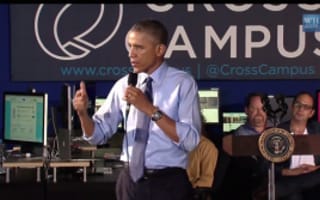[ibimage==33584==Large==none==self==ibimage_align-center]
President Barack Obama stopped by Santa Monica-based coworking space Cross Campus yesterday to give a short speech on the U.S. economy and to answer questions from members of the Los Angeles tech community. The event, which was coordinated by and invite only from the White House, is part of an effort by the President to reach out to the millennial generation. The President explained why a startup coworking space was the best place to do that: "In some ways entrpreneurship is in the DNA of this [millennial] generation."
The President spent much of his time discussing the future of the economy and projects he would like to move forward, despite opposition in Congress.
A theme that kept coming up throughout the President’s speech and talks with entrepreneurs at Cross Campus was a vision for government support and work in certain areas of the economy. In a response to a question about healthcare reform’s impact on technology, President Obama said he sees the Affordable Care Act laying the groundwork for a more innovative healthcare industry. Particularly, he sees technology helping to personalize medical treatment and encourage preventative care.
“We don’t really have a healthcare system; we have a sick care system. Rarely is our system incentivizing people to stay healthy,” Obama said. “Part of what technology is going to do is to encourage people to stay healthier in the first place.”
Additionally, the President said he envisions technology pairing with the work that was done on the human genome project — a research project he stressed was government funded. Obama said because of the research done on the human genome project, and advances in technology, medicine would likely become more personalized.
Improving women participation in technology
When asked about the lack of women in technology the President surprisingly spent most of his time talking about the effect of childhood socialization, rather than programs aimed at pushing women into science, technology, engineering, and math professions later in life, or punitive measures against companies that discriminate based on gender.
“A lot of it starts early. How do we teach math and how do we teach science?” said Obama. “If you never see you in that position then it is hard to imagine, well that’s something I should be doing. We know that these cultural cues that we send out can make an enormous difference.”
Obama cited the effect of the television show CSI. According to studies he cited, around the time the show launched applications for forensics training and jobs went up significantly. If more female STEM role models were seen by young girls that might change their career choices. Unfortunately, until only recently role models have been lacking and “a lot of this is socialization that has lingered,” said Obama.
The President also suggested other approaches to teaching STEM subjects to young girls might be necessary. “Their learning patterns may be different,” said Obama. “It may turn out that girls up to a certain age want a more social environment, in which case if you then have group learning and projects as a way of learning then you may get more interest.”
Striking the right balance on intellectual property
On intellectual property reform the President acknowledged the issue is difficult because many actors in the debate play both sides — meaning some business want stringent copyright and patent protections when it profits them, but want looser intellectual property protection when they can make money off other people’s work. Ultimately, Obama said he is well aware that “the folks that are filing phony patents are costing our best innovators tons.”
The President seels a balance.
“You want sufficient IP that you are encouraging creativity and innovation, but you don’t want those structures so tight that is actually ends up being an inhibitor to people getting information and people coming up with new process,” said Obama.
Government building the infrastructure for success
Ultimately, the President wanted to emphasize that the government has a significant role to play in the 21st century economy, and ultimately the success of entrepreneurship.
“As clunky and as frustrating as government and politics can sometimes be, the fact of the matter is it is still vital,” said Obama. “It is going to help determine whether you have the platform to succeed. It’s still going to be educating the vast majority of our kids. It’s still going to be the lion share of our research dollars. It’s still going to be what makes airports function. Even with new technologies and new models it is going to be the basis by which you are going to get from A to B. The decisions we make will help to determine how successful we are collectively and individually for years to come.”
Have a tip for us or know of a company that deserves coverage? Email us via [email protected]



